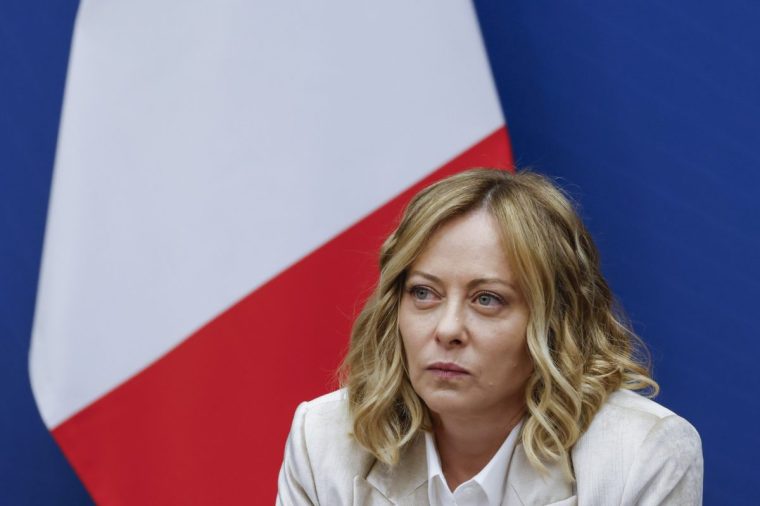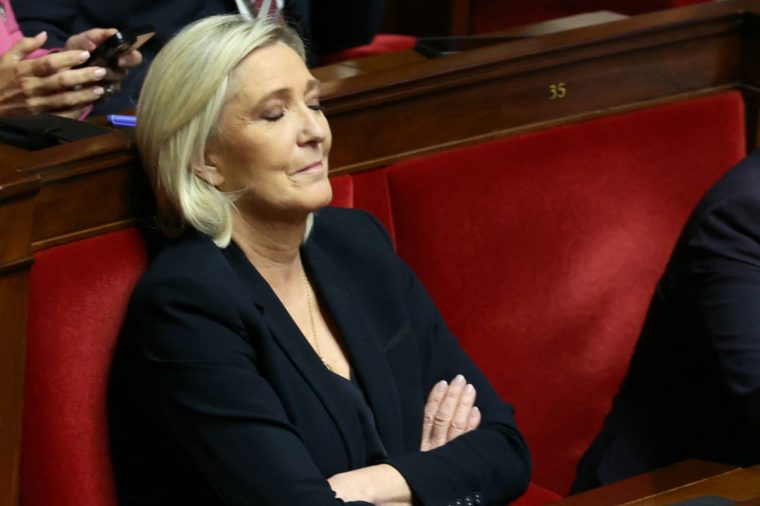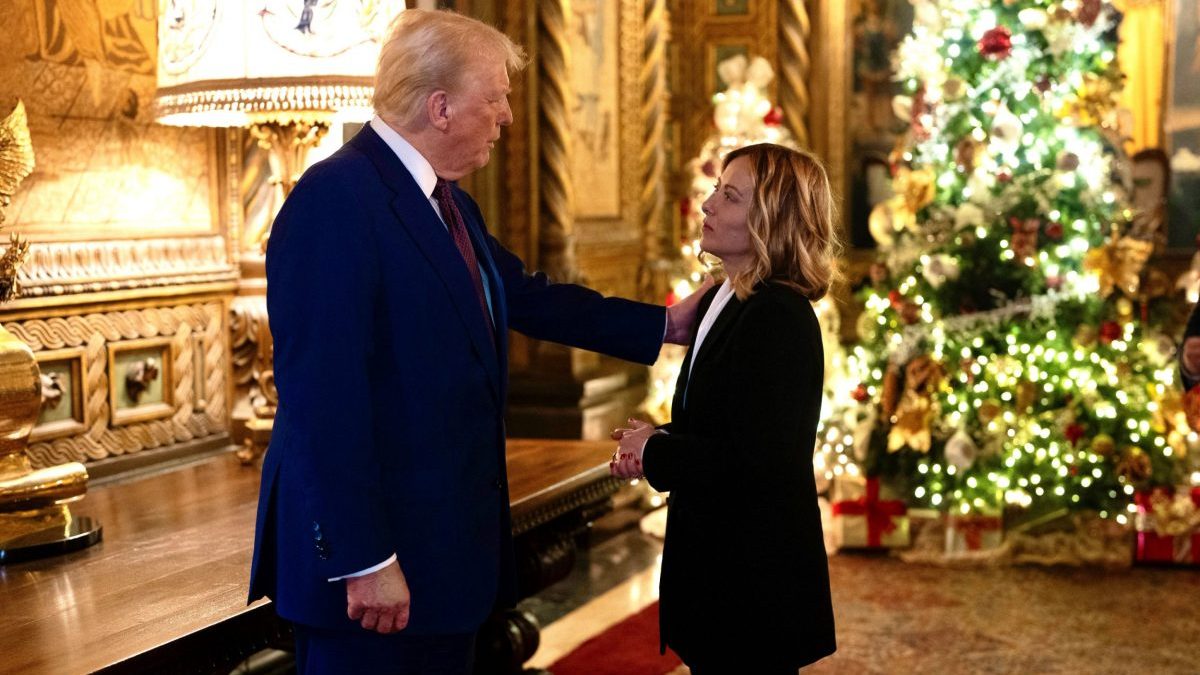By meeting two American presidents in a week Italian Prime Minister Giorgia Meloni was hoping to establish an unofficial role as Europe’s bridge with Washington.
Last Saturday, she made an unannounced trip to meet incoming US President Donald Trump at his Mar-a-Lago home in Florida, and she was only thwarted in welcoming Joe Biden in Rome on Thursday when the White House incumbent cancelled to monitor the raging California wildfires.
Nonetheless, the symbolism was already obvious. Meloni, who is the leader of the hard-rightwing Brothers of Italy (FdI) party, has clear ideological overlaps with Trump: demonising immigrants, lambasting ‘woke’ politics and raging against bureaucracy. While other European leaders struggle to open communication channels with the incoming administration, she seems to have the inside track.
Meloni’s star is rising. Since becoming Italy’s premier at the head of a three-party coalition in 2022, the ultraconservative has been remarkably successful both at home and abroad.
Domestically, she has maintained steady control over the Parliament and the levers of government, a rare feat for any Italian prime minister. Since the October 2022 elections, her party’s polling has even risen, from 26 per cent then to 29 per cent now. While both France and Germany’s governments collapsed at the end of last year, she was boasting of her administration’s “extraordinary” stability with “the political turbulence that several large European nations are facing”.
 Italy’s Premier Giorgia Meloni attends a press conference organized by the Italian Order of Journalists and the Parliamentary Press Association in Rome (Photo: Riccardo De Luca/Getty)
Italy’s Premier Giorgia Meloni attends a press conference organized by the Italian Order of Journalists and the Parliamentary Press Association in Rome (Photo: Riccardo De Luca/Getty)
Many in the European Union are still wary of Meloni’s far-right heritage: she began her political career as an activist in the youth wing of the neo-fascist Italian Social Movement and lavishly praised dictator Benito Mussolini.
But her approach to Brussels proved more pragmatic than many feared, and she has built up an effective working relationship with European Commission President Ursula von der Leyen – notably teaming up to secure controversial deals with Tunisia, Mauritania and Egypt to hold migrants in camps rather than allow them to reach Europe.
She also has more friends around the European Council table now: since becoming Italy’s first female prime minister, her allies flexed their muscles in Europe, with the far-right now in government in the Netherlands, Slovakia and Hungary (with Austria expected soon). France’s far-right Marine Le Pen and Germany’s AfD have become even more popular, while the combined hard right now accounts for more than a quarter of the European Parliament.
 Marine Le Pen reacts during the debate prior to the no-confidence votes on Prime Minister Michel Barnier’s government (Photo: Alain Jocard/ AFP)
Marine Le Pen reacts during the debate prior to the no-confidence votes on Prime Minister Michel Barnier’s government (Photo: Alain Jocard/ AFP)
And while many extreme-right politicians in Europe have wavered in their support for Ukraine in its war against Russia, Meloni has offered fulsome backing for Kyiv – even convincing her fellow rightwinger, Hungary’s Viktor Orbán, to agree to a €50bn aid package to the war-torn country.
Her foreign credentials were also boosted last week when Italian journalist Cecilia Sala was released by the Iranian authorities after a month in jail in Tehran. Telling Sala’s mother that her daughter was free “was the most emotional moment of the past two years,” Meloni said.
Last month, Politico, named Meloni as the most powerful person in Europe, saying she “has gone from being dismissed as an ultranationalist kook to… establishing herself as a figure with whom Brussels, and now Washington, can do business”.
Meloni is already close with Elon Musk, the tech billionaire and Trump associate who is currently tormenting Europe’s mainstream politicians through his X platform. Musk described Meloni as “someone who is even more beautiful on the inside than she is on the outside” at an awards ceremony in New York last year – and later had to deny a romantic relationship with her.
These ties might suggest Meloni is perfectly placed as a ‘Trump whisperer’ for Europe – including Britain – as established politicians struggle to liaise with the erratic and thin-skinned former property tycoon.
Meloni’s supporters certainly see her as an intermediary who could find common ground between Brussels and Washington. “Meloni has demonstrated her ability to lead the country with determination and vision, earning respect not only in Italy but also internationally,” Susanna Ceccardi, an MEP with the Lega party, one of Meloni’s coalition partners, told The i Paper.
Ceccardi says that it was Meloni’s ability to work with both Trump and the outgoing Biden Administration that helped secure Cecilia Sala’s release. “This approach should become a model for Europe as well, where the debate between those advocating resistance and those supporting collaboration with Trump is more heated than ever on crucial geopolitical and economic issues for our future,” she says.
However, seasoned hands in Brussels say Meloni is unlikely to emerge as Europe’s voice in Washington. They say she is simply benefitting from a rare European power vacuum, as French President Emmanuel Macron is weakened at home and German Chancellor Olaf Scholz is expected to lose next month’s elections. In the EU, at least, the power players in Paris and Berlin still set the pace.
“Yes, she’s a player. She’s gained more influence, but her interests are very domestic and they’re very defensive. They’re all about Italy,” says Mujtaba Rahman, the Europe Managing Director of the Eurasia Group. “I don’t think Meloni really has a vision about Europe and what direction the EU should go in, but she has a set of interests around the domestic economy, around migration that are all very much about Italy and Italy’s place in Europe.”
For all her ability to tack to the mainstream in Brussels, her domestic policies unsettle most other European countries. She has used the courts to try to silence critics, launching defamation suits against journalists, teachers and even Placebo’s rockstar frontman Brian Molko, who called her a “fascist” during a concert in 2023. She has also attacked Italian judges who have ruled against her government’s policies, which the Council of Europe warns “puts their independence at risk”.
She has attacked the LGBTQ+ community and forbidden mayors from issuing birth certificates to children born to lesbian couples who used artificial insemination. And even last week, she was pushing conspiracy theories about American financier and philanthropist George Soros controlling politics in Europe – while exculpating her friend Musk’s meddling. “None of this reflects the EU’s core values,” says an EU official. “We are not going to entrust the EU’s interests with someone like this.”
Nor should Meloni assume she will align with the incoming president. Her support for Ukraine may jar with Trump’s seeming indifference to Kyiv. She could also fall foul of Trump’s gripes about European defence spending: Rome fails to meet the Nato commitment to spend two per cent of GDP on defence.
When it comes to trade, Italy – along with the rest of Europe – could still feel the impact of US tariffs that Trump threatens to impose on exports.
If she fails to head these off for the rest of the EU, her political credit would plummet, says Arturo Varvelli, head of the European Council on Foreign Relations office in Rome. “Meloni could leverage her rapport with Musk and Trump to secure favourable bilateral deals, such as reducing tariffs on Italian exports,” he says. “However, there is a risk that she might lean too heavily on these personal relationships, adopting a self-serving transactional approach rather than pushing for a united European front.”
